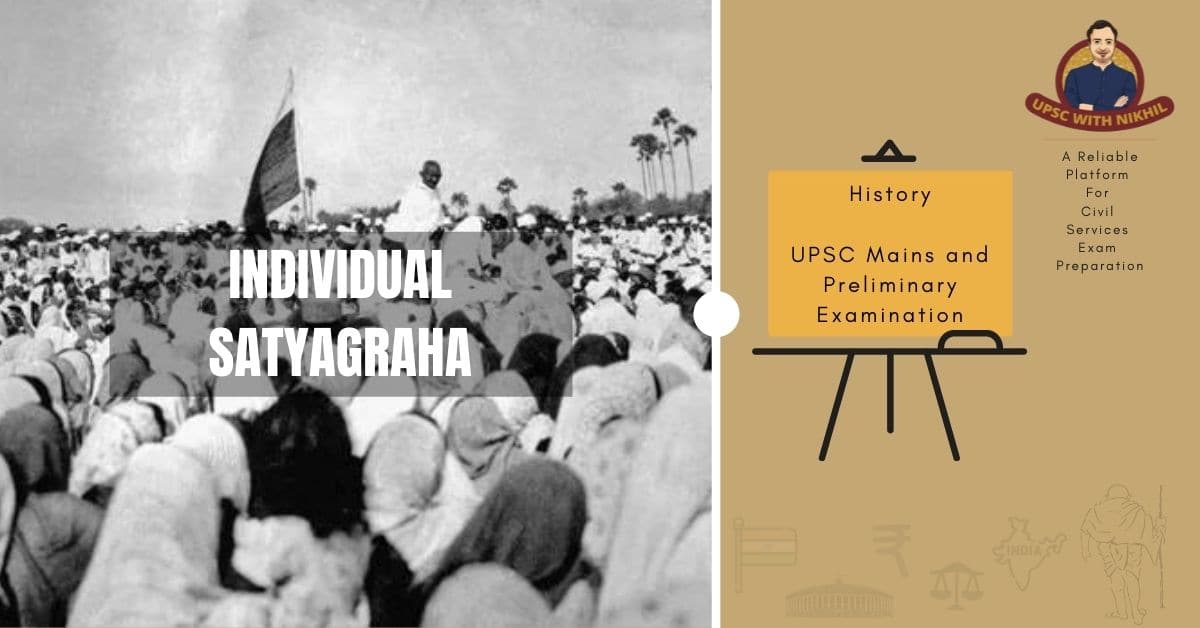Individual Satyagraha
Background: Congress leadership and public were losing patience. The government refused to budge, claiming that no constitutional progress could be made until the Congress reached an agreement with Muslim communalists.
• It kept passing ordinances restricting freedom of expression and the press, as well as the right to form associations.
• Throughout the country, nationalist workers, particularly those on the left, were harassed, arrested, and imprisoned.

• The government was preparing to crush the Congress if it attempted to organise a mass movement. In this situation, the Indians believed it was time to demonstrate to the British that their patience was not a sign of weakness.
• The Congress asked Gandhiji to take command once more near the end of 1940. Within his broad strategic perspective, Gandhiji began to take steps that would lead to a mass struggle. In each locality, he decided to start a limited Satyagraha by a few selected individuals on an individual basis.
A Satyagrahi's demand would be for the freedom of speech to preach against war participation. ‘It is wrong to help the British war effort with men or money,' the Satyagrahi would publicly declare. The only worthwhile effort is nonviolent resistance to all wars.'
Vinoba Bhave was the first Satyagrahi on 17 October 1940, and Jawaharlal Nehru was the second — they were surrounded by huge crowds, and the authorities could often only arrest them after they had given their speeches. If a Satyagrahi was not arrested by the government, he or she would not only repeat the performance, but also move into the villages and begin a trek towards Delhi, thus becoming a part of the ‘Delhi Chalo' movement.
Thus, the Individual Satyagraha served a dual purpose:
a. Itexpressed the Indian people's strong political feelings while also allowing the British government to peacefully accept Indian demands. Because of their anti-Nazi feelings, Gandhiji and the Congress were hesitant to take advantage of Britain's predicament and embarrass her war effort by a mass uprising in India. Gandhiji was also starting to prepare the people for the upcoming struggle. The Congress organisation was being restructured;
b. Opportunist elements were being identified and expelled from the organisation. most importantly, people were being politically aroused, educated, and mobilised. More than 25,000 Satyagrahis had been convicted of individual civil disobedience by May 15, 1941. The government had let many more — lower-level political workers — go free
Situation in world and India:
• During 1941, there were two major changes in British politics. Poland, Belgium, Holland, Norway, and France, as well as the majority of Eastern Europe, had already been occupied by Nazi Germany.
• On June 22, 1941, it launched an attack on the Soviet Union.
• On the 7th of December, Japan launched a surprise attack on the American fleet at Pearl Harbor. It swept through the Philippines, Indo-China, Indonesia, Malaysia, and Burma in a matter of days.
• In March 1942, it took over Rangoon. The war had come to India's doorstep. The King was warned by Winston Churchill, now the British Prime Minister that Burma, Ceylon, Calcutta, and Madras could fall into enemy hands.
• The Indian leaders, who were released from prison in early December, were concerned about the country's security and defence. They were also very concerned about the Soviet Union and China. Many people believed that Hitler's attack on the Soviet Union had changed the war's tone.
• Gandhiji had previously condemned the Japanese slogan "Asia for Asiatics" and urged Indians to boycott Japanese goods.
The Congress Working Committee, eager to defend Indian territory and assist the Allies, overrode Gandhiji and Nehru's objections and passed a resolution at the end of December offering to fully cooperate in the defence of India and the Allies if Britain agreed to give full independence after the war and the substance of power immediately. Gandhiji named Jawaharlal Nehru as his chosen successor at this time.


